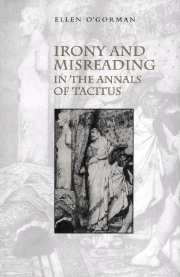Book contents
- Frontmatter
- Contents
- Dedication
- Preface
- 1 Introduction: irony, history, reading
- 2 Imperium sine fine:problems of definition in Annals 1
- 3 Germanicus and the reader in the text
- 4 Reading Tiberius at face value
- 5 Obliteration and the literate emperor
- 6 The empress's plot
- 7 Ghostwriting the emperor Nero
- 8 Conclusion: the end of history
- Bibliography
- General index
- Index locorum
7 - Ghostwriting the emperor Nero
Published online by Cambridge University Press: 30 September 2009
- Frontmatter
- Contents
- Dedication
- Preface
- 1 Introduction: irony, history, reading
- 2 Imperium sine fine:problems of definition in Annals 1
- 3 Germanicus and the reader in the text
- 4 Reading Tiberius at face value
- 5 Obliteration and the literate emperor
- 6 The empress's plot
- 7 Ghostwriting the emperor Nero
- 8 Conclusion: the end of history
- Bibliography
- General index
- Index locorum
Summary
The ‘sense of an ending’, which links a terminus of a process with its origin in such a way as to endow whatever happened in between with a significance that can only be gained by ‘retrospection’, is achieved by the peculiarly human capacity of what Heidegger called ‘repetition’.
Hayden White, The Content of the FormRepetition, witting and unwitting, characterizes imperial Roman history as much as it does an imitative literary tradition.
Philip Hardie, The Epic Successors of VirgilIn the previous chapter I suggested that the voice of the imperial woman constituted a historical narrative which at times subverted or controlled not only Julio-Claudian history but perhaps also Tacitus' own Annals. The dissent from imperial narrative is therefore voiced from within the imperial family itself, diverting the reader's attention away from the senatorial voice of the narrator. Hence I remarked at the end of the last chapter on how Tacitus questions his own narrative with the words ‘to what end will I commemorate?’(quem ad finem memorabimus). The question, couched in terms which evoke the end of memory, reminds us not only of the future to which the history is addressed, but also of the end of (the) history itself. Tacitus' fear is expressed here that the imperial strain on republican language will replace ‘true’ meaning, that the reader will have to internalise and gradually consent to this change of meaning.
- Type
- Chapter
- Information
- Irony and Misreading in the Annals of Tacitus , pp. 144 - 175Publisher: Cambridge University PressPrint publication year: 2000

